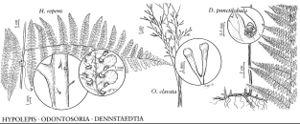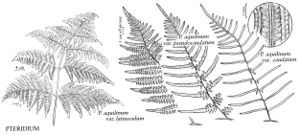Difference between revisions of "Dennstaedtiaceae"
FNA>Volume Importer |
FNA>Volume Importer |
||
| Line 12: | Line 12: | ||
}}<!-- | }}<!-- | ||
| − | --><span class="statement" id="st- | + | --><span class="statement" id="st-undefined" data-properties=""><b>Plants </b>perennial, mostly terrestrial, rarely epiphytic, generally in mesic, forested habitats. <b>Stems</b> short- to long-creeping, solenostelic [protostelic], bearing hairs (or less often scales), often branching by means of buds on proximal part of petiole. <b>Leaves</b> monomorphic, circinate in bud. <b>Petiole</b> not articulate, with 1–many vascular bundles, hairy or glabrous [scaly]. <b>Blade</b> 1-pinnate to decompound (rarely simple), glabrous or hairy or with mixture of hairs and glands; rachis and costae grooved adaxially [not grooved in some genera]. <b>Veins</b> free or sometimes joined at margin in fertile segments, pinnate or forking in ultimate segments. <b>Sori</b> near or at blade margin on vein tips or submarginal commissural vein; true (inner) indusia present, free or fused with portion of blade margin to form cup or pouch, or obscured by revolute and usually modified portion of blade margin [indusia rarely absent]; sporangial stalk of 1–3 rows of cells. <b>Spores</b> not green, tetrahedral or bilateral, monolete or trilete. <b>Gametophytes</b> green, cordate, with archegonia and antheridia borne on lower surface.</span><!-- |
-->{{Treatment/Body | -->{{Treatment/Body | ||
| Line 75: | Line 75: | ||
|publication year= | |publication year= | ||
|special status= | |special status= | ||
| − | |source xml=https://jpend@bitbucket.org/aafc-mbb/fna- | + | |source xml=https://jpend@bitbucket.org/aafc-mbb/fna-data-curation.git/src/9216fc802291cd3df363fd52122300479582ede7/coarse_grained_fna_xml/V2/V2_412.xml |
| − | |||
| − | |||
| − | |||
| − | |||
| − | |||
| − | |||
| − | |||
| − | |||
| − | |||
| − | |||
| − | |||
| − | |||
| − | |||
| − | |||
| − | |||
| − | |||
| − | |||
| − | |||
| − | |||
| − | |||
| − | |||
| − | |||
| − | |||
| − | |||
| − | |||
| − | |||
| − | |||
| − | |||
| − | |||
| − | |||
| − | |||
| − | |||
}}<!-- | }}<!-- | ||
-->[[Category:Treatment]] | -->[[Category:Treatment]] | ||
Revision as of 13:19, 27 July 2019
Plants perennial, mostly terrestrial, rarely epiphytic, generally in mesic, forested habitats. Stems short- to long-creeping, solenostelic [protostelic], bearing hairs (or less often scales), often branching by means of buds on proximal part of petiole. Leaves monomorphic, circinate in bud. Petiole not articulate, with 1–many vascular bundles, hairy or glabrous [scaly]. Blade 1-pinnate to decompound (rarely simple), glabrous or hairy or with mixture of hairs and glands; rachis and costae grooved adaxially [not grooved in some genera]. Veins free or sometimes joined at margin in fertile segments, pinnate or forking in ultimate segments. Sori near or at blade margin on vein tips or submarginal commissural vein; true (inner) indusia present, free or fused with portion of blade margin to form cup or pouch, or obscured by revolute and usually modified portion of blade margin [indusia rarely absent]; sporangial stalk of 1–3 rows of cells. Spores not green, tetrahedral or bilateral, monolete or trilete. Gametophytes green, cordate, with archegonia and antheridia borne on lower surface.
Distribution
Worldwide, mostly tropical.
Discussion
The family is variously circumscribed, in the strict sense including only eight genera, while in the broadest sense encompassing about half the recognized genera of higher ferns (R. E. Holttum 1947). Here it is delimited in the sense of J. T. Mickel (1973). Characteristics that define the family include submarginal or marginal sori with generally two indusia, an inner true indusium and an outer false indusium formed by the revolute, often modified segment margin (although either type may be reduced or absent in some genera); indument usually of hairs rather than scales; and long-creeping protostelic or solenostelic stems with stem buds on the bases of the petioles. Not all genera in the family share all the characteristics.
Genera ca. 20, species perhaps 400 (4 genera, 6 species in the flora).
Selected References
Lower Taxa
Illustrations
Key
| 1 | Sori continuous along margins of segments; inner indusium, if present, hidden by reflexed margin of blade and maturing sporangia; blades usually broadly triangular. | Pteridium |
| 1 | Sori distinct, not continuous along margins of ultimate segments; inner indusium present or absent; blades narrowly deltate to lanceolate to ovate. | > 2 |
| 2 | Sori at tips of ultimate segments; veins dichotomously forked. | Odontosoria |
| 2 | Sori lateral on ultimate segments; veins pinnately branched. | > 3 |
| 3 | Inner indusium absent, outer indusium recurved over sori. | Hypolepis |
| 3 | Inner indusium present, outer indusium fused with inner one to form cup or tubular structure containing sporangia. | Dennstaedtia |

